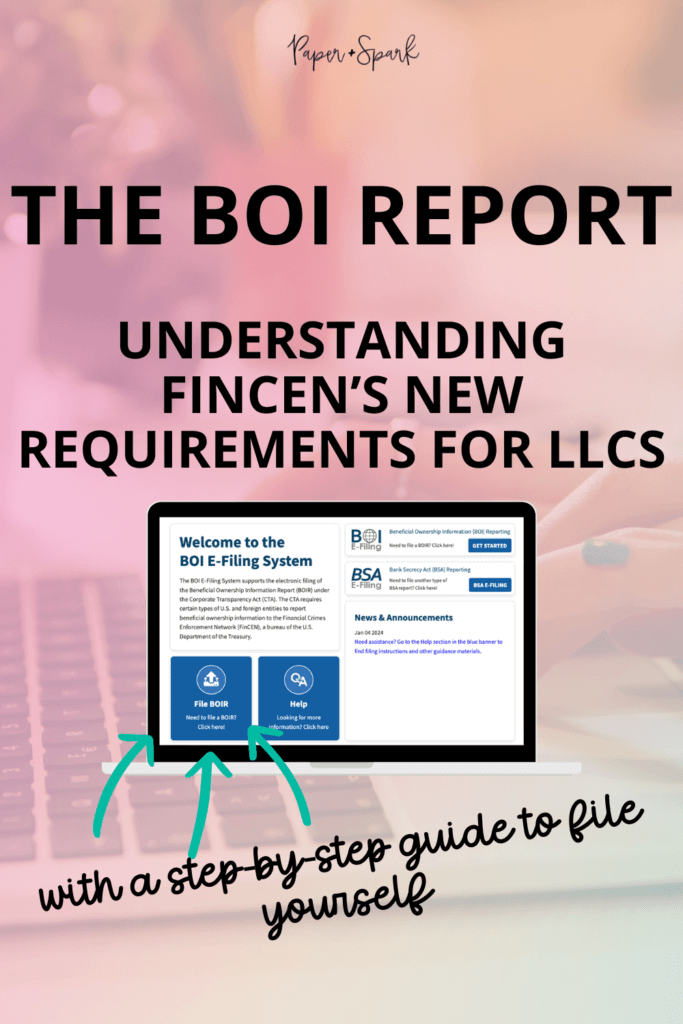Understanding FinCEN’s New BOI Reporting Requirements
What the heck is going on with this new BOI report you may have heard about?! Get all the in-plain-English answers right here – updated as of February 24, 2025.
If you’ve been wondering about the new Beneficial Ownership Information (BOI) reporting requirements issued by FinCEN, you’re not alone. These regulations are causing confusion among small business owners, LLCs, and entrepreneurs across the country. It doesn’t help that things are changing yet again.
In this blog post, I’ll walk you through everything you need to know about filing your BOI report, who these requirements apply to, and how to avoid scams. Let’s get started!
Wanna watch a video on this topic instead (plus learn about things like 1099Ks and other important docus for your biz)? Check out my video on this topic here or watch below.
What is FinCEN?
FinCEN, or the Financial Crimes Enforcement Network, is a part of the US Department of Treasury. Its mission is to safeguard the financial system by combating crimes like money laundering and fraud.
The Corporate Transparency Act (CTA) is a federal law enacted in 2021 (as part of the Anti-Money Laundering Act). The main goal of the CTA is to increase transparency in business ownership and prevent international money laundering, tax evasion, and more. Apparently – the bad guys out there like to use LLCs as shell companies to hide this type of illegal activity. Under the CTA, certain types of US businesses, like LLCs and corporations, will be required to disclose their beneficial ownership information to FinCEN. This ensures that the federal government can identify who owns and controls these entities, promoting accountability and hopefullyreducing financial crime.
If you think back to when you registered for your LLC (IF you have one), you actually did that with your state government. Prior to the CTA and the new BOI requirements, the federal government is not privy to this information. So now we have this new rule via the CTA that theoretically requires businesses (specifically – LLCs) to file BOI reports to provide transparency about their ownership structures.
Does My Business Need to File a BOI Report?
One of the most common questions is, “Who does the BOI reporting requirement apply to?” Let’s break it down.
✅ Businesses That Must File a BOI report:
- LLCs, corporations, and other entities registered to do business in the US
❌ Businesses that do not need to file a BOI report:
- Sole proprietorships that do NOT have their LLC registration 👈 this is the most likely exception to apply to you
- “Large” companies – LLCs or corporations that are publicly traded companies, or have 20+ employees and $5+ million in revenue (this is less likely to apply to you if you’re reading this post, sorry)
- Certain nonprofits, banks, and insurance companies
For the full breakdown of who the BOI requirement applies to/does not apply to, this guide straight from FinCEN is a great resource.
So in other words, if you are a small business with your LLC registration, this new BOI reporting requirement applies to you. If you are a sole prop (with or without a DBA) withOUT an LLC registration, the new BOI reporting requirement does NOT apply to you.
Avoid Scams – You Shouldn’t Have to Pay for to do your BOI report
Unfortunately, like with many new legal filings, scammers and pay-to-file sites are exploiting the new BOI reporting requirements and targeting unknowing small business owners. Here are some tips to protect yourself:
- Only file directly through the FinCEN site: The only official place to file your BOI report is on fincen.gov. Be cautious of websites that claim to assist for a fee.
- Filing is always FREE! If a site asks for payment, it’s a scam. BOI reports are free to file through FinCEN.
- Watch for phishing attempts: FinCEN will not email or call you asking for payment or sensitive details. Report suspicious activity to the authorities.
It’s been a bit tricky because there’s not one official government entity assigned the duty of reaching out to us LLC owners with info or reminders on filing this. It’s just sort of…up to us. You’re on your own kid, you always have been!
How to File Your BOI Report with FinCEN: Step-by-Step Instructions
So now that we got the WHY out of the way, let’s cover the HOW – How to file your BOI report is actually a very straightforward, simple process. Here’s the step-by-step 👇
- Make sure you have your state drivers license or passport handy. You will want to have a scanned JPG or PDF of it ready to submit as well (just the front of your ID or the photo page of your passport).
- Head to the for real FinCEN website at https://www.fincen.gov/
- Click “file your report now”.
- Click “File BOIR”.

- You have two options – you can File your BOIR via a PDF using Adobe Reader, or File it online. I chose the second option and clicked “Prepare & Submit BOIR”.

- Next, you’ll be asked if this is your initial report (alternatively, you may be correcting or updating a prior report). Assuming this is the first time you’re filing, choose “initial report”. Click next.
- Check the box to receive a FinCEN ID.
- Fill in the legal name of your LLC as the “Reporting Company legal name”. This should match the name on your LLC registration with your state.

- Select and then enter your tax identification type – either your EIN or your SSN. I generally opt to use my EIN any time I am given this choice.

- Enter your country of jurisdiction (most likely the US).
- Select your state of formation (wherever you registered your LLC).
- Enter the current physical address of your LLC. Then click next.
- If you are filing your BOI report for an LLC you formed prior to January 1, 2024, then you will check the box that indicates this is an “existing reporting company”. This is important so that you don’t have to fill out info for your company applicant. (Obviously, if you’re a new LLC then don’t check this box.)

- You shouldn’t need to fill anything out until you get to the “Legal Name & Date of Birth” area near the bottom of this page. Enter your legal last & first name, along with your birthday.

- Enter your residential address.
- Finally, choose your form of ID (either your drivers license or your passport). Enter the document ID number from that item, and then attach a JPG or PDF copy of it.

- Check the agree box, and hit next.
- You’ll enter your email and your name, hit agree once again, and submit!
As much fuss as everyone is making about this, it’s really not that tough!
When Do You Need to File Your BOI Report?
The deadline for filing your BOI report depends on when your LLC was formed.
- If your LLC was formed before January 1, 2024: You have until January 1, 2025, to submit your initial BOI report (with the caveats below).
- If your LLC was formed on or after January 1, 2024 until December 31, 2024: You have 90 calendar days from your registration to submit your initial BOI report.
- If your LLC was formed on or after January 1, 2025: You have 30 calendar days from your registration to submit your initial BOI report.
…but hold up, because recent developments in December 2024 & early 2025 have impacted these deadlines 👇
🚨Latest Updates: Enforcement Challenges & Then Reinstatement (and un…statement and reinstatement again)
December 3, 2024: There have been legal challenges that temporarily delayed some aspects of the BOI reporting enforcement. While businesses are still required to comply, penalties for late filings have been paused temporarily.
On December 3, 2024, the U.S. District Court for the Eastern District of Texas issued a nationwide preliminary injunction against the enforcement of CTA. The court’s decision, in the case of Texas Top Cop Shop, Inc., et al. v. Garland, et al., found that the CTA likely exceeded Congress’s constitutional authority, infringing upon states’ rights under the Tenth Amendment.
In response, the U.S. Department of Justice filed a notice of appeal on December 5, 2024, seeking to overturn the injunction. Meanwhile, FinCEN announced that it would comply with the court’s order and temporarily halt enforcement of the BOI reporting requirement. This has led to a lot of confusion and uncertainty about whether to submit your BOI report or not (if you haven’t yet). Bottom line, you can still submit the BOI report, but the potential penalties of not submitting in time for the deadline are currently not enforceable. OOPS – never mind, keep reading!
It’s up to us to stay informed about the ongoing legal proceedings and be prepared to comply promptly if the injunction is lifted. That’s why in my humble opinion, I’m fine just submitting the (very simple) report and being done with this, so I don’t have to worry about it anymore when & if it becomes enforceable again. Stay updated by checking FinCEN’s official updates.
December 23, 2024: Annnnd we’re back on, friends. The US Fifth Circuit of Appeals has now reversed the District Court’s decision & dissolved the preliminary injunction. BOI report requirements (and more importantly – enforcement & penalties) are now back on. FinCEN did us a favor and gave us a few extra days, so now the deadline for 2024 LLCs is January 13, 2025, instead of January 1.
Dec 26, 2024: Getting whiplash over here, y’all! Today, a federal court of appeals officially reinstated the injunction blocking the BOI reporting deadline. This means that, once again for now, the government cannot enforce BOI reporting requirements and small businesses are under no obligation to file these reports while the court decides the case. Again, if you opt not to file by the deadline, it’s up to you to keep monitoring how long the injunction remains in place.
February 18, 2025: The applicable District Court made a decision to stay the injunction, which means that FinCEN can now enforce their BOI reporting requirements. Read FinCEN’s official notice here. The new BOI reporting deadline for the majority of reporting companies is now March 21, 2025.
I’m sure this will be further challenged, and there are rumblings there may be new exceptions for small businesses, but again – it’s not difficult or time-consuming to file this simple report. I personally encourage you to get it out of the way so whatever happens, it doesn’t have to take up any more space in your brain!
BOI Reporting Deadlines & Penalties
The biggest hype around the BOI reporting requirements has been about the potential fines & penalties for not submitting on time (ie, before the NOW March 21, 2025 deadline).
Entities that did not file their BOI report on time, submitted incomplete or inaccurate information, or intentionally provided false information would be subject to penalties of up to $500 per day for each day the violation continued. Additionally, criminal penalties included fines of up to $10,000 and/or imprisonment of up to two years for willful violations, such as deliberately avoiding the filing requirement or submitting fraudulent details.
These steep penalties underscored the seriousness of getting compliant!
Finally, FinCEN has a very comprehensive FAQ page here that pretty much answers every question under the sun on the new requirement.
Questions? Yall let me know!














Is this report a file once and done kind of deal? Unless, changes were made of course.
Yes, it’s only for new LLCs (or existing, prior to 2024), or if you make any ownership changes.
Thank you for such a clear breakdown of this!
Thank you for clarifying! I keep getting emails from my virtual PO Box stating I NEED to file and when they list the exemptions, they don’t say sole proprietors. And of course, they’re promoting they can file for me for a fee. I’m a sole proprietor and have been ignoring their urgent notifications.
Janet – THANK YOU! Once again, you’ve made something I’ve dreaded all year into something easy and, most importantly, now DONE!!! I can’t tell you how much I appreciate this post and all of your insight and wisdom! Again, thank you, thank you, thank you!!!
If I set my LLC but didn’t start doing business – I.e. didn’t file my business license yet, I still need to do this right? I set my LLC in Oct 24.
Yes, but keep in mind the filing deadline for entities creating during 2024 is within 90 calendar days.
I just wanted to thank you so much for doing this. There was so much confusion around this and sometimes hard to find the answers or know what to trust in this day and age. I was going to ask a question about partners in an LLC, but thanks to your FAQ link on their site I found the answer quickly.
I’m so glad this helped!!